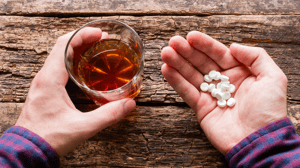The scientific journal JAMA Psychiatry has reported the results of a study carried out by New York University. The use of psilocybin (similar to LSD) under medical supervision, combined with psychotherapy, reduced alcohol abuse by 83%.
From the late 1940s to mid-1960s trailblazers glimpsed and then demonstrated with the methods of the time that psychedelics (hallucinogenic substances like LSD that can alter the state of consciousness) could also have therapeutic effects, if handled appropriately and under strict medical supervision. Now as studies draw to a close, their views have been confirmed. In those days, however, data mostly came from individual experiences, or from studies carried out on small groups of patients, thus making the results unusable by today's scientific standards. Research into these substances resumed several years ago, and a number of study groups around the world are aiming to gauge their possible therapeutic effects on depression and other psychological disorders, while proceeding with all possible caution. Psychedelics are extremely powerful, even after just one dose and, in some cases, can cause irreversible personality changes.
As part of this research, the results of an interesting study by researchers at New York University's Langone Centre for Psychedelic Medicine were published at the end of August in the JAMA Psychiatry journal. With the approval of the university's ethics committee, these researchers experimented with small doses of psilocybin (similar to LSD) to reduce alcohol addiction. The study involved 93 men and women with alcohol dependency, who were randomly assigned to receive psilocybin (one to three doses), or a placebo (antihistamine). All of them also underwent 12 sessions of psychotherapy, both before and after the drug treatment.
Alcoholics - it should be stressed - are defined as people who drink four or more glasses of alcohol a day if women and five or more if men. The study was double-blind, i.e. neither the researchers nor the patients knew which substance was being used, although, due to the powerful effects of psilocybin, patients and doctors soon realised which group they belonged to.
Taking psilocybin: the results
In the first eight months after treatment began, New York psychiatrists confirmed that people given psilocybin reduced their alcohol consumption by 83% compared to before the study started. During the same time frame, those who received antihistamines reduced their alcohol consumption by 51%.
But that's not all: the study also showed that eight months after the first dose, almost half (48%) of those treated with psilocybin had stopped drinking altogether, compared with 24% of the placebo group: results never seen before with previous treatments. The mechanisms that led to this are not yet properly understood and probably depend on changes in nerve connections in specific areas of the brain.
"In any case," commented Michael Bogenschutz, coordinator of the trial and director of the Langone Centre for Psychedelic Medicine, " our study strongly suggests that psilocybin is a promising method of treating alcohol abuse disorders, a complex disease that has proven notoriously difficult to manage.”
The Psilocybin Study: there are still some aspects to explore
There are, however, some weak points, including the fact that the study dealt with a relatively small number of patients, without subgroups including, for example, people with other psychiatric illnesses or those who drank varying amounts of alcohol. The differences between the reaction of males and females were not studied and neither were the effects of the drugs over a longer period of time.
However, the study is considered important, given the subject matter and the lack of effective treatments to help alcoholics handle their addiction. Bogenschutz is already planning a larger study on at least 200 alcoholics, with the planned involvement of other organisations. If the outcome proves positive, as is expected, the next step will be to seek authorisation from the Food and Drug Administration (the body that regulates the experimentation and use of drugs in the U.S.) to use psilocybin in clinical practice (and not just in experimental programmes) as a medicine - always in combination with psychotherapy and at specialised centres.
Psilocybin is a natural compound derived from mushrooms that lead to altered mental states similar to LSD and mescaline. Most of the participants in the study experienced profound alterations in perception, emotions and sense of self. As psilocybin raises blood pressure and heart rate and can also cause serious and sometimes disabling psychological effects, researchers warn that it should only be used in carefully controlled settings and in combination with a thorough psychological evaluation.


